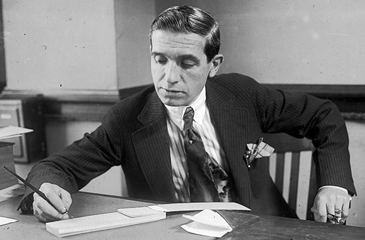|
Charles Ponzi
Answer
to Name
This Famous Person Game - December 2014
by Mike McLeod
|
 |
|
|
Alex Trebek: “The infamous name that has become generic with pyramid schemes.”
Me: “Who is Charles Ponzi, Alex.”
Alex: “Correct, Mike. Go again.”
Sorry, I have been watching Jeopardy lately and daydreaming.
Ted Carlton of Utah correctly identified him.
It seems ironic that Ponzi would become so notorious over such a little thing as a postage stamp. Of course, taking in a million dollar per week in 1920 was not a little thing.
|

Charles Ponzi
|

The mansion Ponzi bought in Lexington, Mass., for $35,000 a few months before he was arrested. It is for sale now for $2,975,000.
|
In 1918, Charles Ponzi received a letter from Spain containing an IRC (International Response Coupon) which was good for purchasing a U.S. stamp as return postage. A company had requested a copy of a catalog Ponzi offered (but never produced), and they sent an IRC to cover its postage.
The IRC caught his attention because it cost less in Spain than the cost of the U.S. stamp he could buy with it. To accommodate the need for paying for return postage between countries when purchasing products and so on, an international commission created IRCs. Ponzi knew that in the depressed economy after World War II in his homeland of Italy, the cost of postage was much less than in America. Ponzi saw an opportunity.
He sent money to relatives to buy IRCs and mail them to him. Here, he took the IRCs to the post office to exchange for higher value stamps that he could sell and make a profit on. (There was paperwork involved, and it was not a simple process.) Even though the value was only pennies, the profit margin was between 200% and 400% per stamp.
But this was not how Ponzi bilked thousands of people of their investments. Even though his scam only lasted a few months in 1920, he was at one point bringing in the unbelievable sum of $1 million per week. Obviously, there was no way to buy that many IRCs, convert them to stamps, and sell them quickly enough to make good on his investment promise of paying out $150 in 90 days for $100 invested. Actually, Ponzi was paying the $150 earlier, in 45 days, to whip up the greed in more investors. Of course, he wasn’t buying IRCs. He was using the new investors’ money to pay off the old investors.
Ponzi had seen this scam before. When he emigrated to America and then moved to Canada, he found a job at a bank that provided loans at a high interest rate. It also offered high interest rates on deposits. When the bank ran short of funds to pay depositors, it used the money from new investors to pay them. The bank folded, of course, and Ponzi lost his job. But he kept the scam.
For a few months in 1920, Ponzi and his wife Rose lived the high life. He bought a mansion in Lexington, Mass., and they became quite a sensation in the community.
Ponzi’s scheme began to unravel in July after local newspaper articles questioned his solvency and the feasibility of buying and selling so many IRCs—several times the amount that the U.S. Post Office said were in circulation. These articles and investigations by the authorities caused a run on his office from investors demanding their money back, which Ponzi and his staff of 30 confidently paid off. With up to a million dollars coming in per week before the run, cash was stashed everywhere in his office.
Ponzi actually held out for about two weeks of paying back huge lines of angry investors, but eventually, the cash that he could put his hands on ran out. The authorities ordered his bank, Hanover Trust Bank of Boston, to stop cashing his checks to cover the creditors, and the house of cards came crashing down. The bank also came crashing down, as did four other Ponzi-infected banks.
In all, Ponzi took in about $20 million1 (multiply that amount by 11 to get 2014 dollars), and he paid back about $7 million. The other investors who did not get to Ponzi in time received about 30 cents on the dollar.
Ponzi went to federal prison for a few years for fraud, was released, and then was arrested immediately by Massachusetts police. However, he made bail and fled to Florida, where he set up a real estate scam. Ponzi was eventually arrested and sent back to Massachusetts’ where he served about seven years in prison. The Federal Government then deported him to Italy because he never obtained American citizenship.
From Italy, Ponzi went to Brazil, where he died a pauper on Jan. 18, 1949.
-----------------------------
1
Bloomberg Businessweek, “The Greatest Financial Scandals,” http://images.businessweek.com/ss/09/03/0311_madoff/3.htm
Learn
about more Famous People
|